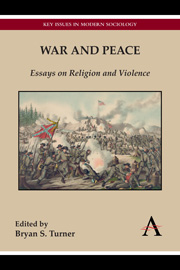Book contents
- Frontmatter
- Contents
- Acknowledgments
- Contributors
- Introduction by Bryan S. Turner
- War
- Peace
- Chapter 5 Quakers, the Origins of the Peace Testimony and Resistance to War Taxes
- Chapter 6 A Sacred Ground for Peace: Violence, Tourism and Sanctification in Hiroshima 1960—1970
- Chapter 7 The Sectarian as a Category of Secular Power: Sectarian Tensions and Judicial Authority in Lebanon
- Chapter 8 The Commodification of Love: Gandhi, King and 1960s Counterculture
- Chapter 9 The Religion of Brotherly Love: Leo Tolstoy and Max Weber
Chapter 9 - The Religion of Brotherly Love: Leo Tolstoy and Max Weber
from Peace
Published online by Cambridge University Press: 05 May 2013
- Frontmatter
- Contents
- Acknowledgments
- Contributors
- Introduction by Bryan S. Turner
- War
- Peace
- Chapter 5 Quakers, the Origins of the Peace Testimony and Resistance to War Taxes
- Chapter 6 A Sacred Ground for Peace: Violence, Tourism and Sanctification in Hiroshima 1960—1970
- Chapter 7 The Sectarian as a Category of Secular Power: Sectarian Tensions and Judicial Authority in Lebanon
- Chapter 8 The Commodification of Love: Gandhi, King and 1960s Counterculture
- Chapter 9 The Religion of Brotherly Love: Leo Tolstoy and Max Weber
Summary
Introduction: Axial-Age Religions
The world religions have, through much of human history, embraced radical criticisms of earthly violence and, at the same time, have been deeply implicated in the conduct of violence. In this chapter I look at war and peace through the lens of Max Weber's sociology of religion, and explore his relationship to the radical pacifism of Leo Tolstoy. Weber's contrast between an ethic of absolute ends and an ethic of responsibility offers a powerful insight into the contradictions that attend religion's response to the world. However, before turning to Weber, we need a framework within which to understand the idea of a “world religion” and in order to get that initial perspective I turn to the philosophy of Karl Jaspers. In his controversial The Origin and Goal of History (1953), originally published in 1949, Jaspers proposed that an “axial age” (Achsenzeit) occurred between 800 and 200 BC, and that the critical turning point was around 500 BC. For Jaspers, this period was the great age of the prophets and religious leaders, such as Confucius and Lao-Tse in China, the Buddha in India, Zoroaster in Iran, the prophets of ancient Israel and finally the poets and philosophers of ancient Greece. Through apocalyptic revelation, the prophets offered humanity a notion of an alternative world beyond and different from the mundane world of the here and now.
- Type
- Chapter
- Information
- War and PeaceEssays on Religion and Violence, pp. 185 - 204Publisher: Anthem PressPrint publication year: 2013



